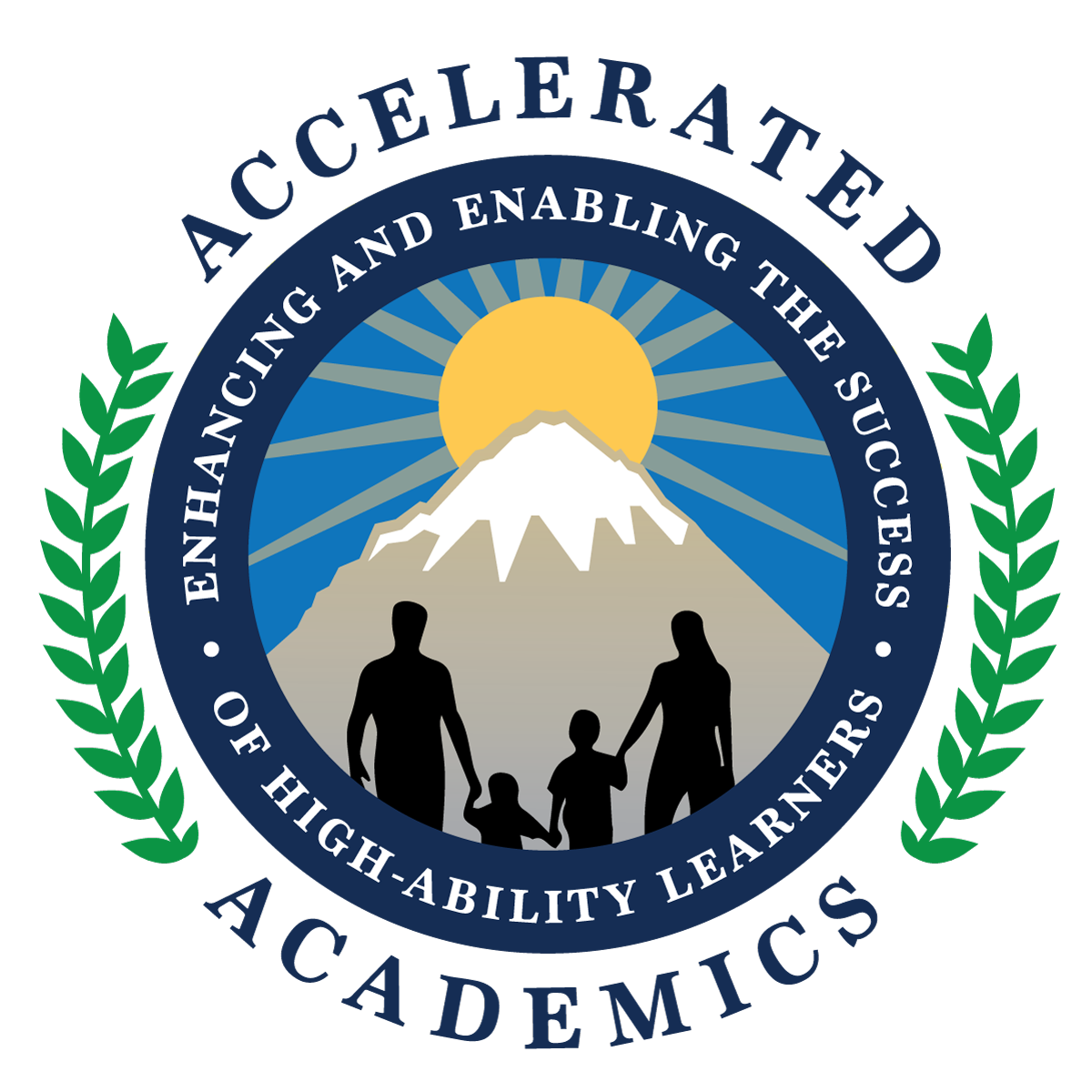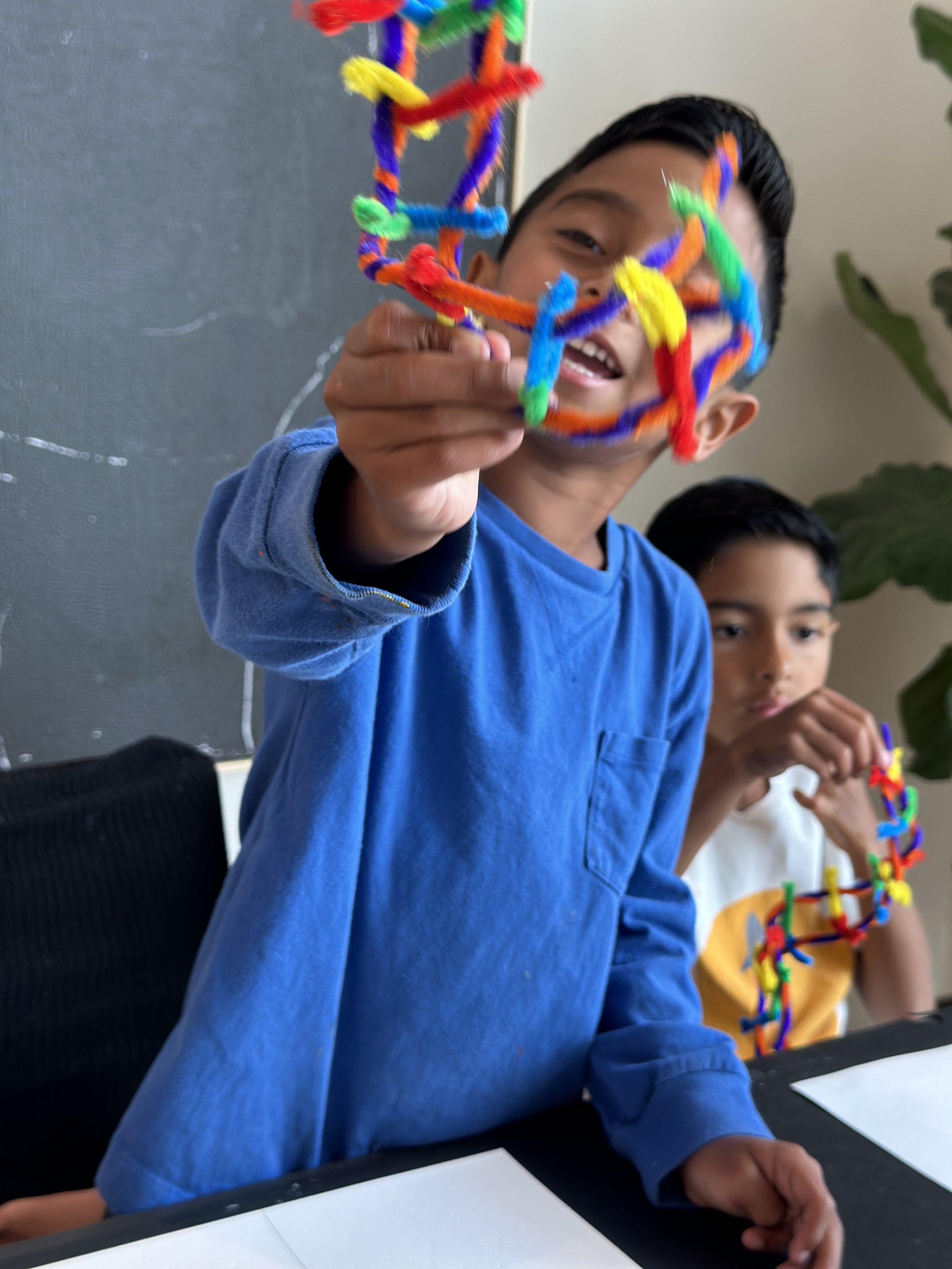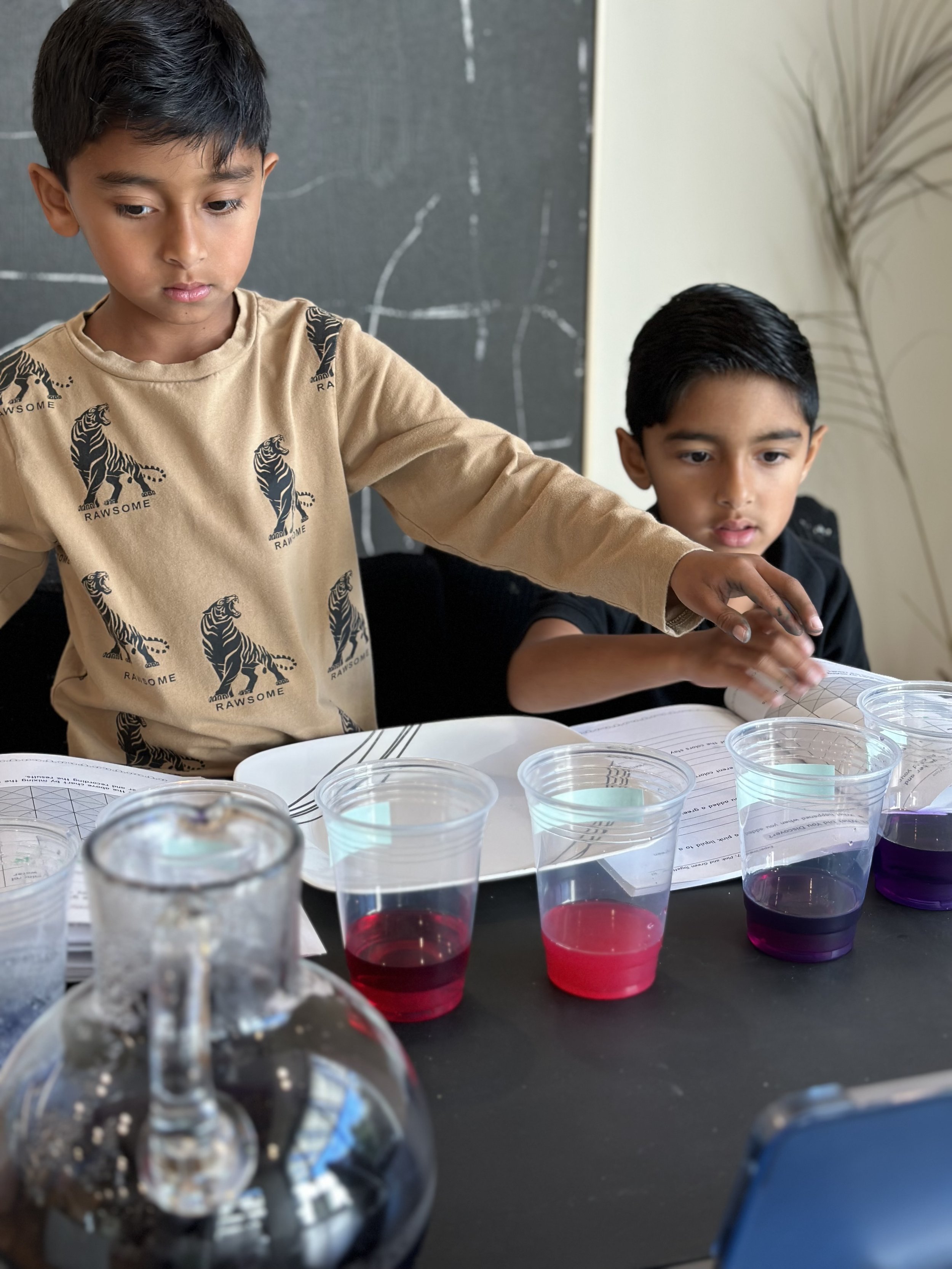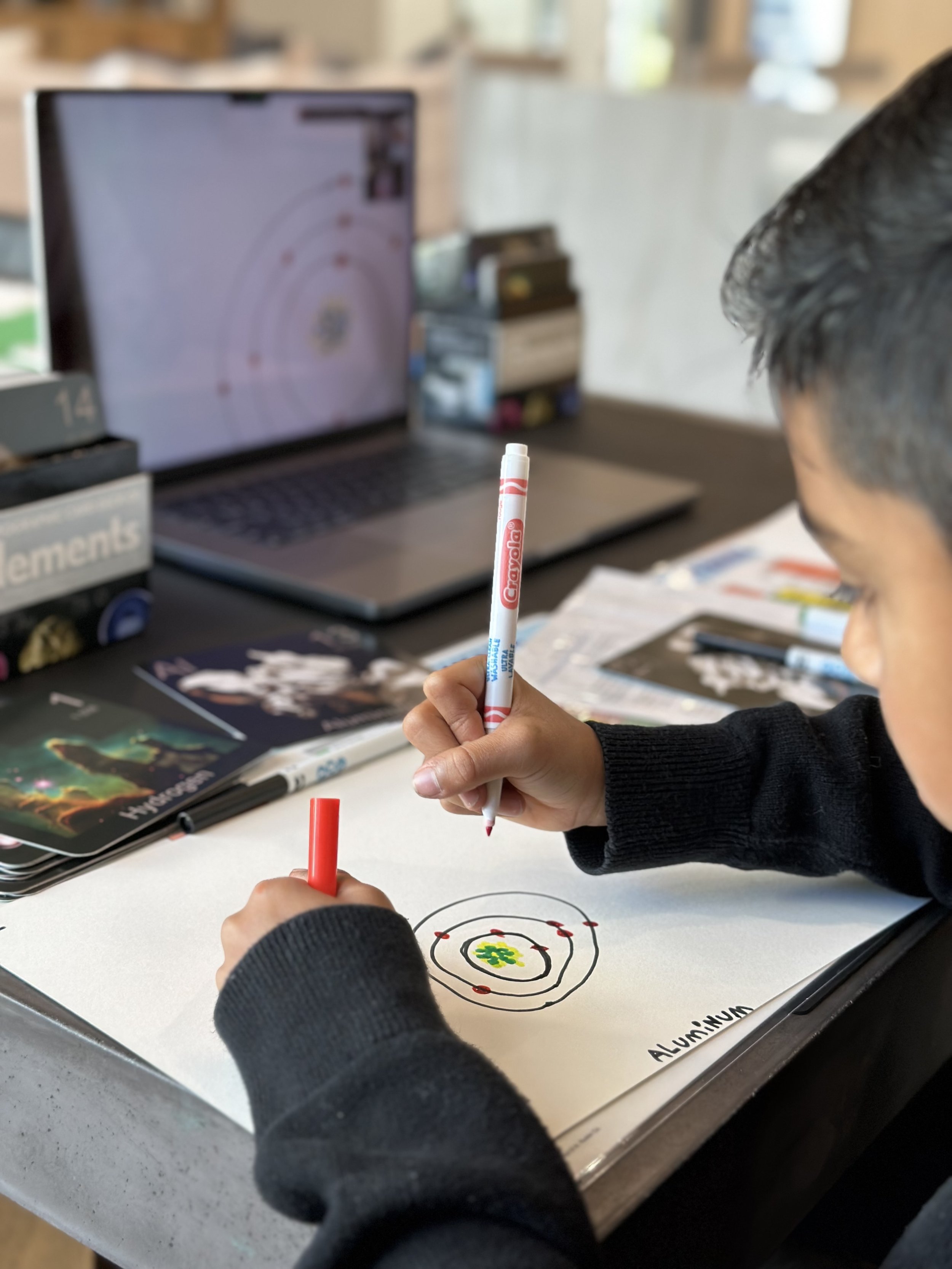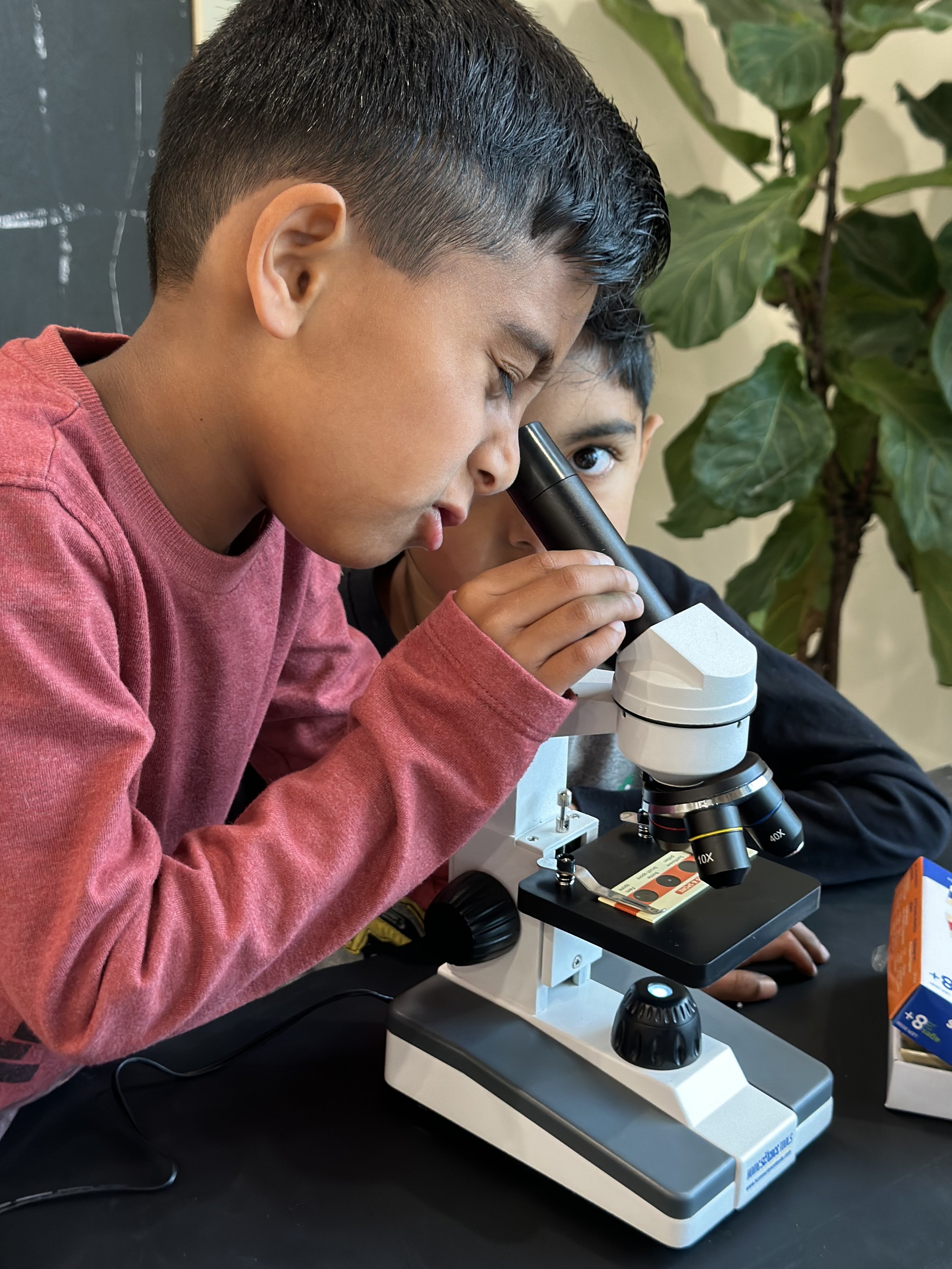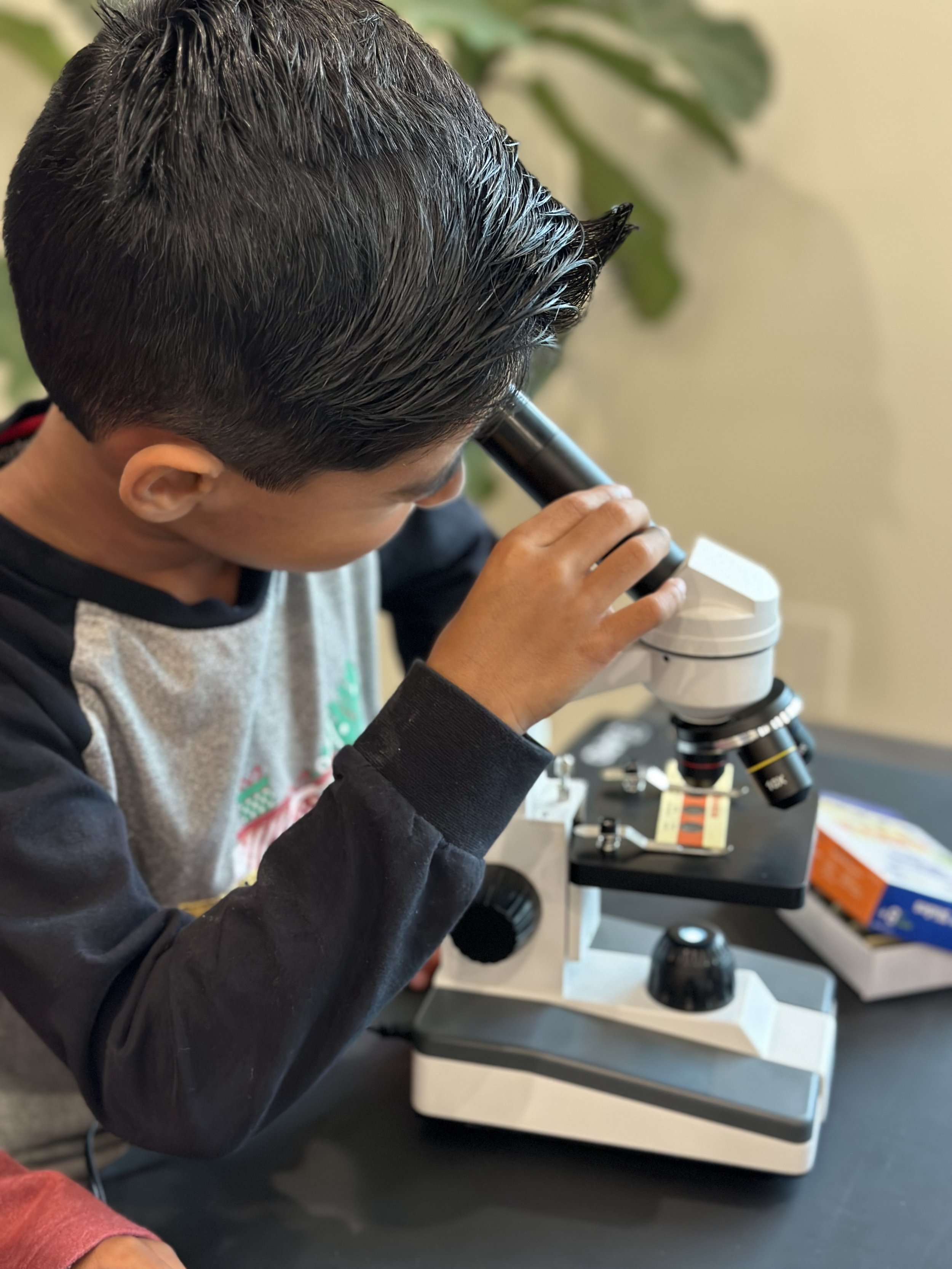Now is the Time to Enroll for the 2024-2025 School Year
Accelerated Academics, a Private School Satellite Program (PSP) founded by Gifted Educational Specialist, Jenelle S. Miller, Ed.D., provides a variety of services for students with high-intellectual, and/or creative abilities and talents. We offer full and part-time instruction, as well as individually selected enrichment courses. Our curriculum is presented via an online one-on-one instructional method individually designed to match the academic strengths and interests of our accelerated learners. An additional opportunity frequently accessed by our students and their families is the flexibility Accelerated Academics provides for continued instruction during occasional family travel.
Now Taking Enrollment Applications for the 2024-2025 School Year.
Anecdotes from a Parent of Highly Gifted Twins
We started Chemistry and Biology classes with at Accelerated Academics when the boys were 5 years old. Dr. Miller recognized right away that each child had advanced learning abilities and identified them as gifted learners. We went through their curriculum and she identified many areas where we could challenge the boys and advance their learning. I was not knowledgeable about gifted education and Dr. Miller recommended many resources including books, videos, and websites. Many of which I have read multiple times as they have been very impactful for my family.
The boys are involved in a lot of programs and classes but Dr. Miller is their absolute favorite class and teacher. Dr. Miller has developed their love and passion for the sciences. They have advanced two grade levels in Math and Language Arts since starting in her program. The boys recently completed abilities testing. Dr. Miller was not only spot on in recognizing their learning capabilities but also in identifying their learning styles, strengths and weaknesses.
Here are some candid pictures from some of our classes.
Making a DNA Strand from Pipe Cleaners
Science Experiment
Drawing the Aluminum Atom
Learning to Use a Microscope for Biology Class
Learning to Use a Microscope for Biology Class
Field Trip to the San Diego County Fair Plant*Grow*Eat Program
We just arrived at the Fair with our plants.
On Wednesday, June 7, four of my students, their parents, and I took a field trip to the San Diego County Fair for the annual Plant-Grow-Eat Program. We came from different locations around Southern California and met each other there in person for the first time.
Blue Ribbon Time. Congratulations Jameson and Abel.
Each of the students from around the San Diego area were provided with materials (seeds, soil, and a planter pot) for growing a radish plant. At the fair all of the students presented their plants and the judges handed out awards for the biggest, healthiest plants. Twins Jameson and Abel were awarded first place blue ribbons for their plants. Maverik was also awarded a blue first-place ribbon, and his sister, Iliana was awarded a second place ribbon.
In the Petting Farm.
We were able to walk around the fair during pre-fair hours and see many farm animals including a petting area where we could feed and pet the goats and some other animals. It was a fun, enjoyable learning experience.
Iliana feeding the goats.
Maverik petting a pig and feeding a goat.
We had a fun day.
Congratulations to 7th Grader Noah Raimo, NHD-CA State Finalist 2022
Noah Raimo with State Finalist Award medal from the NHD-LA contest
Congratulations are in order for Noah Raimo, 7th grader at Accelerated Academics for the award he received for his Website Entry, The Alaskan Purchase: Seward’s Folly or … , at the National History Day - Los Angeles Contest that was held on March 14, 2022.
Noah’s Junior Individual Website entry was one of three websites from this category that were selected out of many middle school website entries within the Los Angeles County School District to move on to the NHD-CA State Finals 2022 contest. He has renamed his website, Exchanging Alaska: Wisdom or Folly?, for the upcoming contest. The State Finals will be held on May 6-8, 2022 at William Jessup University in Rocklin, CA.
National History Day, is a year-long educational program that encourages students to explore local, state, national, and world history. Each year, NHD presents a different theme as a lens for students to look through as they select and study their historical topic of interest. This year’s theme was Debate & Diplomacy in History: Successes, Failures, Consequences. Noah’s participation in NHD this year was his first. Through this comprehensive program, he has learned many valuable advanced research and presentation skills that he can carry with him throughout his life.
Noah described the reason for his topic selection by stating, “The Alaskan Purchase just stood out, and since I knew gaining more land was a success and the U.S. had to use diplomacy to work out a purchase, it would fit the year's theme, so I started researching it.” Noah also shared how he searched for some of his primary sources regarding the Alaskan Purchase, “I used the Library of Congress webpages to find most of my Primary sources for my project.”
Congratulations, Noah, and best wishes for a wonderful experience as a NHD-CA State Finalist as you showcase your website project about the Alaskan Purchase. We, at Accelerated Academics, are so proud of you and your accomplishments.
— Dr. Jenelle S. Miller, Teacher
Ways that Gifted Students Learn Differenly From Their Peers
Matthew Lynch wrote a blog for Education Week on June 13, 2016 titled, "5 Ways Gifted Students Learn Differently." His message conveys that it is critical for educators to understand how gifted students learn differently from their peers in order to provide successful learning experiences. Please follow the link below to read Lynch's article.
Ways Children Learn →
Have you ever wondered about the different ways children learn? For instance, some children are good listeners and have good organizational skills while other children have trouble listening and appear disorganized, but they learn best through visualizing the material and have their own way of organizing their world. Traditional classrooms tend to favor the good listener/sequential (organized) learner, but students who do not fit that learning style tend to miss the learning moments and may exhibit problematic behaviors in the classroom (i.e. daydreaming/not paying attention, disorganized, etc.).
Linda Kreger Silverman, Ph.D., a licensed psychologist who has been studying learning differences for over 40 years, is a noted author, researcher and popular international speaker. She has compiled a chart of information describing the difference between an auditory-sequential learner and a visual-spatial learner. Please follow the link to her website for a close look at her informative chart: http://visualspatial.org/vslasl.php
Gifted Learners Reaching for the Stars →
By Jenelle S. Miller, Ed.D.
Children should have the opportunity to stretch their minds and increase their capacity for learning every day. They should be allowed to follow their curiosities and encouraged to wonder. A learning environment, whether public, private, or at-home, should inspire children to reach for the stars rather than always having to wait until others catch up. Children who stand out as gifted among their peers should be given opportunities to accelerate at a pace that reflects their abilities and motivation to learn.
The National Association for Gifted Children (NAGC) reprinted an article by Carol Ann Thomlinson, Ed.D., of The University of Virginia titled, What it Means to Teach Gifted Learners Well. In this article, Dr. Thomlinson discussed the difference between good instruction and inappropriate instruction for gifted learners.
"Imagine the Possibilities" at the NAGC Convention 11/3-6/2016 →
By Dr. Jenelle S. Miller
Left to right: Marie Thornsberry, Jenelle Miller, Dana Reupert, Ann Smith, Kari Hanson-Smith
Last weekend I enjoyed attending the 63rd Annual Convention of the National Association for Gifted Children (NAGC) at the Walt Disney World Resort in Orlando, Florida. I was excited to meet with my colleagues who are Board Members of the California Association for the Gifted (CAG) as well as several colleagues and friends from the University of Iowa's Belin-Blank International Center in Gifted Education and Talent Development.
The theme of the convention was "Imagine the Possibilities," which was fitting due to our location at the Walt Disney World Resort. Our Opening Keynote Speaker, Alex Wright, Creative Director of Walt Disney Imagineering, spoke on The Wonderful World of Creativity. Alex focused on "Dreamers" and "Doers." He said, "things that seem impossible now will become realities tomorrow." He talked about how he brainstorms ideas with his creative team and that "any idea is fair game with no boundaries" - he called that "Blue Sky Rules." Alex believes that there is "no such thing as a bad idea (not literally true)," but that "you don't know where that idea might lead." He continued, "It's not a good idea to spend time talking about why an idea can't be done because that stops the flow of ideas. Things don't just spring into being; people make them happen." Creative thought can be brought into any endeavor by imagining, "What if this? What if that?" Most of all, we need to foster curiosity with our students because that leads to creativity. We must encourage our gifted kids to "pursue the path to think differently. Anyone can be creative, but Imagineering is beyond that." Alex says that he never walks into a creative session thinking that he has all or the best idea. That would mean that all the ideas haven't been heard; ideas that could be added to or influence his idea in order for the best idea to unfold.
The Keynote session was a great way to launch the conference and there were many more exciting and informative sessions that followed.
Accelerated Academics' Students Tour San Diego Central Public Library →
By Dr. Jenelle S. Miller
Isabel, Fabienne, and Ethan Sparks touring the Central Branch of the San Diego Public Library
Yesterday (Wednesday, September 21, 2017), two of my students from Accelerated Academics and their father/teacher accompanied me to the Central Branch of the San Diego Public Library in Downtown San Diego. The purpose of our visit was for a National History Day (NHD) Orientation, which included a tour with docent David Brands as well as a topic brainstorming session with the Jayne Henn, the manager of the Denny Sanford Children’s Library. My students, Fabienne and Isabel, are gearing up to participate in this year’s NHD competition and wanted to learn how to best utilize the library for their research projects.
The tour of this brand new and very large library by the docent was fascinating and highly beneficial. In addition to learning about the history of the planning and construction of the library, we visited the special collections area, technology rooms, and the teen room; saw where we could utilize group meeting rooms; and met several skilled individuals who will be available to provide us with expert help regarding our research. We also learned that we may use the library’s multi-media technology and 3-D printers for our own projects and that we can access technology experts who are there to assist us when we need help. All of these things and more make this library one to which we definitely plan to return and utilize over the coming days, weeks, months, and years.
When talking to the girls and their father about their experience during the tour, Fabienne exclaimed, “I want to live here!” and Isabel and her father are looking forward to their next opportunity to return and conduct some research. Our docent/tour guide and the children’s librarian have definitely succeeded in inspiring my students to dive in to their research projects with passion.
There are so many purposes to use the resources at the Central Branch of the San Diego Public Library - National History Day is only one of them. We plan to utilize this great resource to its fullest extent. It has everything we could possibly need for an abundance of great educational experiences.
Accelerated Academics Featured in FINE Magazine's September 2016 Edition →
The faculty and staff at Accelerated Academics would like to let our friends and family know that the September 1st issue of FINE Magazine (the Education Issue), published in Del Mar, CA by the FINE Media Group, contains a feature article about our school written by Thea Carney titled, "At-Home Learning." We ask that you share this article with your friends, family, and others whom you believe might like to explore the idea of students in grades K-12 learning in the comfort of their own homes at a pace tailored for their educational goals and lifestyles.
Our full-page feature article is located on page 46. We are also mentioned in an additional article titled, "In Lieu of Public: Alternative Education Options Around San Diego" located at the bottom left of page 42. Please follow the FINE Magazine link below:
FINE Magazine
Fun with Storytelling, Puppets, and Mensa Kids
By Dr. Jenelle S. Miller
The National Mensa Annual Gathering was held in San Diego at the beginning of July 2016. The gathering hosted numerous programs and special events for members of Mensa and their guests. To qualify for Mensa, you must have scored in the top 2 percent of the general population on any one of more than 200 accepted, standardized intelligence tests — including Mensa administered admission tests — at any point in your life.
I had the unique pleasure of attending this gathering to assist with the children’s program which consisted of about 60 Mensa students between the ages of 4 and 12. In between a couple of science sessions, I engaged the children in a unique story that has been a part of my family since my father was a little boy. As you will see in the photo taken during the event, I became a storyteller and performed the Tajar Tales with puppets. Back in 1993 my artist sister, Jill Kerry, and I republished this whimsical tale written by Jane Shaw Ward in the 1920s; and then created the puppets, plush Tajar dolls, and an audio CD to develop a complete "story kit." I often use the story kit as an example during my "Student Publisher's Workshop" where I teach children how to collaborate together to write, illustrate, and narrate stories as well as make puppets and perform puppet shows. My sister and I are both big fans of including the Arts in education.
Competitions for Gifted and Talented Students
I am very excited and happy to announce that I will be teaching a 3-week online course/workshop for educators next fall about competitions for gifted and talented students. This course will be held from September 12-30 through the University of Iowa's Belin-Blank Center. I will announce the online registration information as soon as the fall schedule is posted on their website.
The course description is as follows:
“Educators often encourage participation in competitions in- or outside of the classroom as a means to develop and enhance the academic, creative, and leadership talents and abilities of gifted students. Researchers suggest that there are both advantages and disadvantages to the participation in competitions; with the right tools and a good roadmap, the experience can be exciting and memorable for you and your students.”
Involving students in a competition is more than just having them participate in a program in order to compete with others; it is a provision that can be made for gifted students to thoroughly follow a theme, go deeper into the content of a topic of interest, and learn valuable presentation skills that can be used over a lifetime. The benefits of learning new information and skills by following the various processes and steps involved with an assortment of diverse competitions are limitless.
This workshop is in the format of a Web Quest and will guide participants to discover some new and exciting possibilities for their students. More information to follow.
Jenelle S. Miller, Ed.D.
Maximizing What Works For Your Child: A Recipe for Success
What makes a recipe successful is the customization and enhancement of the ingredients by the cook for the enjoyment and health of the consumer. What makes a learning plan successful is the customization and enhancement of the learning opportunities by the parent/teacher for the socio-emotional health and academic engagement of the child. All children are different; and no one book of instructions is able to provide all the answers for successfully raising and educating any individual child. However, just like in a recipe book where a number of key ingredients are needed to create a delicious meal, a number of key strategies exist that can help you know and understand your child more thoroughly, thus enabling his or her success in life. At times, some of the ingredients in a recipe need to be adjusted in order to eliminate adverse reactions which might negatively affect certain customers. Sometimes specific ingredients need to be added to the recipe in order to enhance the flavor to suit an individual's taste or provide an additional level of enjoyment and nutrition. By exploring and understanding the learning styles, interests, reasoning abilities, and achievements of a child, one is able to create and customize an individualized learning plan (ILP) that will enhance, enable, and maximize his or her success.
Learning Styles
There are several different learning styles, meaning there are several different ways to learn. Knowing a child’s learning style allows the parent/teacher to adapt or modify the curriculum or curriculum delivery in a way that will maximize his or her learning potential. Types of learning styles include:
- Visual/Spatial: pictures, images, and spatial understanding
- Aural/Auditory-Musical: sound and music
- Verbal/Linguistic: words in speech and writing
- Logical/Mathematical: logic, reasoning, and systems
- Physical/Kinesthetic: body, hands, and sense of touch
- Social/Interpersonal: prefers to work and be with others
- Solitary/Intrapersonal: prefers to work and be alone
A child’s preferred learning style represents his or her strength. It is important to spend time working in his or her preferred style as well as working to develop the child’s least preferred or weaker style of learning.
Interests
Engaging a child in meaningful learning opportunities often depends upon the ideas and interests that he or she would like to pursue. Parents/teachers are important to the process of helping children think about and discover their own personal ideas, interests, and passions. Children as well as adults are more able to learn and retain information when they are studying things that are meaningful to them.
Reasoning Abilities
Children have varied levels of cognitive skills, many of which will change, grow, and adapt over a lifetime. Therefore, assessing a child for their cognitive reasoning abilities is a means to provide parents/teachers with insight into his or her learning potential. The results of such an assessment can help to identify learning disabilities so that instructors can provide remediation; or to identify giftedness and academic potential so that instructors can provide enriched learning experiences designed to develop a child’s gifts and talents.
Achievement
Assessing and evaluating a child’s achievement level provides parents/teachers with important baseline information that will help determine the academic level in which to start in order to reach maximum success. What does your child know? What does your child still need to learn? Does your child perform at the top percentile of the grade-level standardized achievement test in relation to same aged peers? If so, what is his or her true grade-level equivalency? Does he or she need to accelerate in some subjects or are there areas where he or she needs to catch up? These questions can be answered with the proper assessments and evaluations.
Children are unique and require an individualized approach to their education. Accelerated Academics, Inc. offers parents/teachers a number of evaluative tools that will provide information about their children’s strengths and weaknesses, how they learn, what they know, and how they think. This information is essential for creating a successful learning atmosphere that will nurture the socio-emotional health and academic engagement of the “whole child.”
Legislation Day in Sacramento: Advocacy for Gifted and Talented Education
Jenelle and John Miller at the state Capitol building in Sacramento, California, April 11, 2016
New experiences are treasured adventures. That’s how Monday, April 11, 2016 felt to me when my husband and I accompanied several other Board members of the California Association for the Gifted (CAG) in meetings with senators and assembly members at the State Capitol building in Sacramento, California. This was my first experience as a Board Member/Parent Advocate for gifted and talented education at the legislative level. Prior to our meetings with legislators, I and other CAG Board members contacted our state legislators to set up times for individual meetings. I am a constituent of Senator, Ben Hueso of the 40th Senate District and Assemblywoman, Lorena Gonzalez of the 80th District. I was fortunate to secure a meeting with Senator Hueso, himself, and grateful to schedule a meeting with Assemblywoman Gonzalez’s staff member, Laurel Brodzinsky.
The purpose of our meetings was to introduce ourselves to our state legislators and offer ourselves as resources of information about gifted and talented education (GATE). We provided each legislator with a folder containing information about CAG including our mission statement and our regional educator and parent representatives. Also included were the following three CAG position papers that can be found on the CAG Website: “Characteristics of Gifted Children,” “Twice-Exceptional Gifted Students,” and “Extending and Differentiating the California Common Core Standards.”
The results of our meetings were outstanding. Senator Hueso thanked us for the information and expressed the desire to help us as we press forward to advocate for legislation that will increase and provide better services for GATE in California, especially where it concerns minority populations in his district. Assemblywoman Gonzalez’s staff member assured us that she would pass on the information to Gonzalez. Having the opportunity to present resources and create awareness for gifted education among our state legislators was our ultimate goal and made CAG Legislation Day at the California State Capitol a huge success.
Senator Ben Hueso, Jenelle Miller, John Miller
Happy Pi Day! →
Today is Pi Day. Click on the title link to find out why Pi Day is special.
Here are a few other links for Pi Day activities from MAKE:
Celebrate Raspberry Pi’s Fourth Birthday with These 5 Pi Projects
How Far Can You Memorize Pi? Show Off Your Skills with These Memory Tricks
From other sources:
Enjoy your Pi Day exploration and activities!
Securing an Appropriate Education for your 2E Student
I found a great article today that I would like to share with you. The article was written by Mark Woodsmall, Esq. to assist 2E families in pursuing and obtaining an appropriate education for your children. Please follow the link below:
Portfolios for Homeschoolers: Historical Keepsakes and Documented Evidence of Student Learning
Some states require homeschool parents to provide annual evidence of student learning by either having their children take standardized tests or by keeping a portfolio of student work that is reviewed by a certified teacher within a local school district. Student portfolios are traditionally kept by certified teachers in public schools as an alternative assessment tool to demonstrate learning. Process-oriented portfolios demonstrate the growth and improvement of a student’s skills and abilities over time during the learning process. Product-oriented portfolios showcase the selection of final products that represent a student’s best or highest quality work. How, then, do keeping and maintaining student portfolios relate to homeschoolers in the state of California?
California doesn’t require homeschoolers to take standardized tests or to keep a portfolio. Nevertheless, the California State Regulations of Private and Home Schools states that “true and accurate records regarding the courses of study must be maintained by private schools,” which includes students who are homeschooled. Section 44237. Cal. Educ. Code §33190. In addition, “students who are schooled at home in California should receive instruction in the various branches of study required in the public schools.” According to Cal. Educ. Code §51210, the following courses “must be taught to students in grades one through six: English, math, social science, science, visual and performing arts, health, and physical education.” In grades seven through twelve, the following courses “should be offered: English, social sciences; foreign languages (starting no later than seventh grade); physical education; science; mathematics; visual and performing arts; applied arts; career technical education; automobile driver education; and other studies that may be prescribed by the governing board.” Cal. Educ. Code §§51220, 51222. It is important to note, however, that homeschoolers under the Affidavit for private schools (Cal. Educ. Code §33190) have no written state or local school district curriculum requirements or guidelines because California’s grade level standards and adopted materials do not apply to students schooled at home. It is up to parents who educate their children at home to select and provide all curriculum, instruction, and materials. This seems somewhat confusing because parents need to keep “true and accurate records” of the course of study for courses that “must” or “should” be taught; however, California’s curriculum standards and materials do not apply to homeschoolers. With that in mind, how might keeping a portfolio of student work benefit homeschoolers?
Keeping a portfolio record of student work can be an enjoyable way for parents and their children to track the journey of their learning experiences together over time; to document what has been learned, what needs to be learned, what has worked, and the process it took to accomplish their own personalized educational goals. Such a record of student work becomes a historical family keepsake or scrapbook, verifying all of the committed effort, hard work, and fun that both parents and students invested together into the learning process. Hence, what categories of documents should be collected?
Depending upon the type or purpose of the portfolio, some suggested documents to collect are as follows, but not limited to:
Daily Attendance Log
Daily Coursework Log
Reading List Log
Project Log
Physical Education Log
Competition Log
Field Trip Log
Vacation Log
Math Pre-test/Post Test Samples
Writing Samples (First Draft and Final Paper)
Final Project Samples
Subsequently, how might representative artifacts and samples of student work be selected?
In a homeschool environment, it is imperative that parents and children be partners. In order for a successful educational experience, they must commit to working together as a team and set reachable learning goals. Parents are accountable for assessing their children and providing appropriate learning experiences and guidance, and students are responsible for engaging in the learning process. Therefore, the participation of both parents and students in the selection of sample work to be showcased in the portfolio is essential. By approaching portfolio development as a team, two major things are accomplished: 1) parents have the means to evaluate their teaching methods and the educational experiences they have provided by looking at what has caused student improvement what has been unsatisfactory; and 2) students have the opportunity to evaluate themselves and determine where they personally have excelled or need more work.
Over the years, portfolios have the potential to provide homeschoolers with invaluable archival records of their education. In addition, when it comes time to prepare for college, a well-documented and well-organized portfolio can help the college applicant design and write up his or her own transcript. The college portfolio then becomes a unique document and vital presentation reflecting the knowledge, skills, beliefs, and talents the student has achieved during his or her homeschool learning experience.
For more information on how to prepare a portfolio, contact Dr. Jenelle Miller at http://www.acceleratedacademics.org/contact/
Resources
Homeschool Portfolio Evaluations Shouldn’t Be Scary!
Student Portfolios as an Assessment Tool
Student Portfolios: Classroom Uses
Homeschooling: A Beneficial Option for Gifted and Talented Students
Parents typically desire that their children receive an appropriate education that leads to a successful life. Parents of high-ability or profoundly gifted children or children who are twice-exceptional (gifted with disabilities) often struggle with school and district personnel as they advocate for a suitable differentiated education that will meet their students’ academic and socio-emotional needs. Diminished funding resources for gifted programs and the lack of teacher/administrator training and professional development are some of the major issues that negatively affect the public school experience for gifted learners and their parents.
An educational environment undertaken primarily at home for gifted students can provide an unlimited atmosphere for learning, so long as the parent is committed to the process of providing engaging and challenging learning opportunities. Parents of high-ability learners usually understand that their students have a variety of different needs, interests, and strengths. In a homeschool setting some gifted students may prefer to work one-on-one with a parent or mentor, others may thrive with independently accessed accelerated on-line courses or self-directed problem-based learning. Furthermore, the daily homeschool program can be customized to fit the needs of the learner who is highly talented in areas where they need flexible schedules to practice and compete in physical activities (i.e. dance, gymnastics, equestrian, ice skating, tennis, golf, skateboarding, etc.).
Parents who desire to take on the role of homeschooling often feel daunted by the unknown circumstances of where to begin; and they may worry that they are not qualified to teach their children. These noble parents would benefit from the support and guidance of a professional educator who is trained in gifted education and who oversees a private school satellite program (PSP) for homeschool families. This professional could help parents understand how to effectively personalize and individualize the educational experiences of their gifted children. Additionally, opportunities for parents to gain confidence by learning a variety of teaching strategies from this educator and for networking with other homeschool parents within the PSP could play a major role in the success of the overall homeschool experience.
References:
"Homeschooling the Gifted Learner." Position Papers. California Association for the Gifted, 21 Nov. 2004. Web. 12 Jan. 2016. <https://c.ymcdn.com/sites/cagifted.site-ym.com/resource/resmgr/docs/position09hg.pdf>.
Homeschooled with MIT courses at 5, accepted to MIT at 15 →
This may be a good option for some... Homeschooling and MIT Open Courses. This article focuses on Ahaan Rungta who acquired his entire elementary and secondary education from OpenCourseWare and MITx as a homeschooler.
